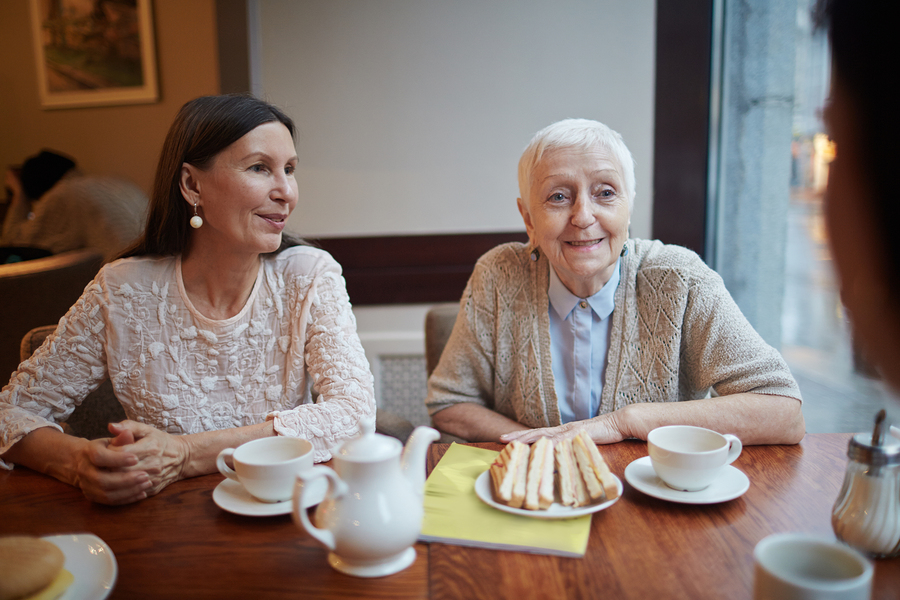For many people, going out to eat was always more than just a way to enjoy a good meal. It was a chance to relax, step away from cooking and cleaning, and savor favorite dishes while connecting with friends, family, and the community. If your loved one with Alzheimer’s used to look forward to Friday night dinners out, there is no reason to stop that tradition altogether. While dining out may take more planning and patience, it can still be a rewarding and joyful experience. While dining out may take more planning and patience, it can still be a rewarding part of Alzheimer’s care. With a few thoughtful adjustments, you can help your loved one continue enjoying one of life’s simple pleasures.
Why Getting Out Is Important
Alzheimer’s can sometimes cause individuals to feel more isolated from the world around them. Familiar routines and outings, such as dining at a favorite restaurant, provide an opportunity for stimulation, socialization, and comfort. These moments outside the home can help trigger positive memories and improve overall mood.
Engaging in activities your loved one once enjoyed also helps maintain a sense of normalcy. A meal at a familiar place may remind them of past traditions, while new experiences can encourage social engagement and reduce feelings of isolation. Even small outings, like a quick lunch at a local café, can support their emotional and cognitive well-being.
At Golden Heart Walnut Creek, we encourage families to maintain these meaningful traditions when possible. A thoughtfully planned meal out can do more than fill the stomach—it can fill the heart.
Four Steps to Take Before You Leave the House
Preparation is key when dining out with a loved one who has Alzheimer’s. Taking time to prepare beforehand will help reduce stress and make the outing more enjoyable for both of you. Here are four important steps:
- Provide gentle reminders throughout the day. Talk to your loved one about where you are going and show them the restaurant’s menu or pictures of dishes to help them feel more comfortable and familiar.
- Choose easy, comfortable clothing. Avoid clothing with tricky fasteners or distracting accessories. Stick to simple outfits that make it easier to sit comfortably and move around.
- Start preparations early. It often takes longer for someone with Alzheimer’s to get ready. Allow plenty of time for grooming, dressing, and any personal care so there is no rush.
- Pick a familiar restaurant. Going somewhere they already know can help ease anxiety and make the experience smoother.
By planning ahead, you create an environment where your loved one feels calm and secure, which sets the tone for a pleasant outing.
Five Tips for Enjoying Your Meal
Once you arrive at the restaurant, it helps to keep a few strategies in mind to make the experience successful. These tips can help you and your loved one enjoy your time together:
- Be patient. Decisions and movements may take longer, and that’s okay. Let the staff know if you need extra time.
- Request a quiet table. Sitting away from noise and distractions, and ideally near the restroom, will provide more comfort and convenience.
- Simplify meal choices. Present just two or three options your loved one already enjoys instead of overwhelming them with the entire menu. Visuals, such as pictures of the dishes, can be especially helpful.
- Ask for small adjustments. Servers are usually happy to fill glasses halfway, bring utensils that are easier to handle, or even allow you to use a personal cup from home.
- Offer finger foods. Ordering a simple appetizer, like breadsticks or small bites, helps keep your loved one engaged while waiting for the main meal.
Dining out with someone who has Alzheimer’s may not always go exactly as planned, but patience and flexibility make a big difference.
Additional Considerations for a Smooth Experience
In addition to the basic tips above, here are some other helpful ideas:
- Keep meals short and avoid peak dining times to reduce noise and crowds.
- Bring along comfort items, such as a familiar scarf or small photo, to provide reassurance.
- Watch for signs of fatigue. If your loved one seems overwhelmed, consider asking for the meal to be packed up and enjoy the rest at home.
- Celebrate the small successes. Even if things don’t go perfectly, the fact that you shared the experience together is what matters most.
Quick Checklist Before Dining Out
To make preparation easier, here’s a quick list to run through before heading out:
- Comfortable, easy-to-remove clothing
- Familiar restaurant selection
- Early start for grooming and getting ready
- Visual aids (photos of menu items)
- Patience, flexibility, and a sense of humor
This checklist can help ensure that both you and your loved one enjoy the meal without unnecessary stress.
Final Thoughts
Dining out with a loved one who has Alzheimer’s does require some planning and patience, but it is well worth the effort. These outings provide meaningful opportunities to connect, reminisce, and enjoy life together. By focusing on preparation, choosing the right setting, and approaching the experience with flexibility, you can create moments of joy and comfort for your loved one.
At Golden Heart Walnut Creek, we understand how important these special experiences are. We believe that Alzheimer’s care should include not only daily support at home but also the preservation of meaningful traditions that bring joy and dignity. Whether it’s a casual lunch or a cherished Friday night dinner, your loved one deserves to keep enjoying the activities that make life feel rich and meaningful.
If you or an aging loved one is considering Alzheimer’s care in Pleasant Hill, CA, please contact the caring staff at Golden Heart Senior Care of Walnut Creek. (925) 203-3039.

